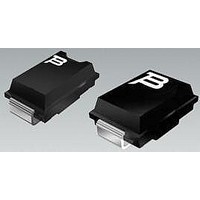TISP4265H4BJR-S Bourns Inc., TISP4265H4BJR-S Datasheet - Page 9

TISP4265H4BJR-S
Manufacturer Part Number
TISP4265H4BJR-S
Description
Sidacs PROTECTOR - SINGLE BIDIRECTIONAL
Manufacturer
Bourns Inc.
Datasheet
1.TISP4015H1BJR-S.pdf
(9 pages)
Specifications of TISP4265H4BJR-S
Breakover Current Ibo Max
60 A
Rated Repetitive Off-state Voltage Vdrm
200 V
Off-state Leakage Current @ Vdrm Idrm
0.005 mA
Forward Voltage Drop
3 V
Mounting Style
SMD/SMT
Package / Case
DO-214AA
Lead Free Status / RoHS Status
Lead free / RoHS Compliant
Specifications are subject to change without notice.
Customers should verify actual device performance in their specific applications.
“TISP” is a trademark of Bourns, Ltd., a Bourns Company, and is Registered in U.S. Patent and Trademark Office.
“Bourns” is a registered trademark of Bourns, Inc. in the U.S. and other countries.
cases, signal protection, Th5, Th6, Th9 and Th10, can be TISP4015H1 type devices with a 15 V voltage protection level.
For an HDSL d.c. feed voltage of 180 V or less and operation down to an ambient of -25 °C, the following Th1, Th2, Th3 and Th4 protectors
are suitable: TISP4250M3 or TISP4250H3, TISP3250H3 (combines Th1 and Th2 or Th3 and Th4) and TISP7250H3 (combines Th1, Th2 and
Th7 or Th3, Th4 and Th8). Possible overcurrent protection components are covered in the 2-wire digital systems clause.
For ISDN interfaces powered with ±40 V (ETSI, ETS 300 012 1992) the following Th1, Th2, Th3 and Th4 protectors are suitable: TISP4070M3 or
TISP4070H3 or TISP4070L3, TISP3070F3 or TISP3070H3 (combines Th1 and Th2 or Th3 and Th4) and TISP7070F3 or TISP7070H3 (combines
Th1, Th2 and Th7 or Th3, Th4 and Th8). At the terminating adaptor, the Th7 and Th8 protectors do not “see” the d.c. feed voltage and should
be selected to not clip the maximum signal level. Generally, the TISP40xxH1 series will be suitable.
Internal ISDN lines are not exposed to high stress levels and the chances of a.c. power intrusion are low (ETSI EN 300 386-2 1997).
Accordingly, the equipment port protection needs are at a lower level than ports connected to outside lines.
Using the existing house telephone wiring, home phone networking systems place the local network traffic in a high band above the POTS and
ADSL (Asymmetrical Digital Subscriber Line) spectrum. Local network rates are 1 Mbps or more. To reject noise and harmonics, an in-line
protection and 5 MHz to 10 MHz bandpass filter module is used for the equipment. These modules are available from magnetic component
manufacturers (e.g. Bel Fuse Inc.) A typical circuit for the telephone line magnetics module is shown in Figure 8. Transformer T1 isolates the
equipment from the house wiring. The isolated winding output is voltage limited by a very low-voltage protector, Th1. With a differential voltage
of about 12 V peak to peak, the TISP4015H1 could be used for Th1. After filtering, connection is made to the differential transceiver of the
processing IC.
AUGUST 1999 - REVISED JANUARY 2007
Home Phone Networking
4-Wire Digital Systems
Th5
Th6
TISP40xxH1BJ VLV Overvoltage Protector Series
SIGNAL
SIGNAL
DC FEED
T1
T2
Figure 8. Home Phone Networking Isolation/filter/protection Circuit
Th1
Th2
Th3
Th4
HRTRX+
HRTRX-
AI4XAP
TRANSFORMER COUPLED FOUR-WIRE INTERFACE
PROTECTION
PROTECTION
CURRENT
CURRENT
Figure 7. 4-Wire System
OVER-
OVER-
FILTER
LINE 1
LINE 2
PROTECTION
PROTECTION
CURRENT
CURRENT
OVER-
OVER-
PROTECTION
Th1
T1
Th7
Th8
C1
DC SUPPLY
TIP
RING
T3
T4
SIGNAL
SIGNAL
AI4XAM
Th10
Th9









